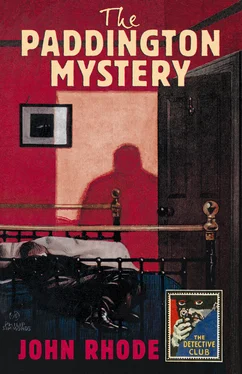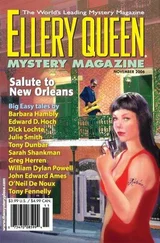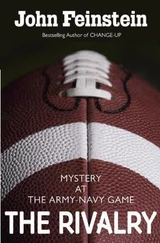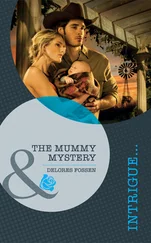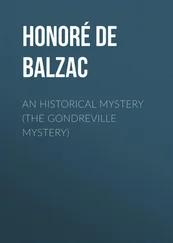But two pseudonyms weren’t enough and, astonishingly, ‘Rhode’ also became ‘Cecil Waye’, a fact that was only discovered long after his death. For the four ‘Cecil Waye’ books, Street created two new series characters—the brother and sister team of Christopher and Vivienne Perrin, two investigators rather in the mould of Agatha Christie’s ‘Young Adventurers’, Tommy and Tuppence Beresford. The Perrins would appear in four novels, which are now among the rarest of John Street’s books. Curiously, the first ‘Cecil Waye’ title— Murder at Monk’s Barn —is a detective story very much in the style that he would use for most of his ‘John Rhode’ and ‘Miles Burton’ books. However, the other three are metropolitan thrillers, with less than convincing plots, especially the best-known, The Prime Minister’s Pencil .
As well as writing detective stories, John Street was also a member of the Detection Club, the illustrious dining club whose purpose, in Street’s words, was for detective story writers ‘to dine together at stated intervals for the purpose of discussing matters concerned with their craft’. As one of the founding members, Street’s most important contribution was the creation of Eric the Skull, which—showing that he had not lost his youthful technical skills—he wired up with lights so that the eye sockets glowed red during the initiation ceremony for new members. Eric the Skull still participates in the rituals by which new members are admitted to the Detection Club. Street also edited Detection Medley , the first and arguably best anthology of stories by members of the Club, and he contributed to the Club’s first two round-robin detective novels, The Floating Admiral and Ask a Policeman , as well as the excellent true crime anthology The Anatomy of Murder and one of their series of detective radio plays. Street was also happy to help other Detection Club members with scientific and technical aspects of their own work, including those giants of the genre Dorothy L. Sayers and John Dickson Carr; in fact Carr later made Street the inspiration for his character Colonel March, head of The Department of Queer Complaints .
In an authoritative and essential study of some of the lesser luminaries of the Golden Age, the American writer Curtis Evans described John Street as ‘the master of murder means’ and praised his ‘fiendish ingenuity [in] the creative application of science and engineering’. For Street is genuinely ingenious, devising seemingly impossible crimes in locked houses, locked bathrooms and locked railway compartments, and even—in Drop to his Death (co-authored with Carr)—a locked elevator. Who else but Street could come up with the idea of using a hedgehog as a murder weapon? A marrow? A hot water bottle? Even bed-sheets and pyjamas are lethal in his hands.
Street’s books are also noteworthy for their humour and social observations, and he doesn’t shy from defying some of the expectations of the genre: in one novel Dr Priestley allows a murderer to go free, and in another the guilty party is identified and put on trial … but acquitted.
John Street died on 8 December 1964. Half a century later, while he is not as highly regarded by critics as, say, Christie, Carr or Sayers, he remains one of the most popular writers of the Golden Age, producing more than 140 of what one fan neatly described as ‘pure and clever detective stories’. Not a bad epitaph.
TONY MEDAWAR
November 2017
‘STEADY, sir!’ exclaimed the taxi-driver sharply.
Harold Merefield made a wild clutch at the open door of the vehicle and managed to save himself from falling into the roadway.
‘It—it’s all right,’ he stammered. ‘Beastly shlippery tonight, must be a frost. Wosher fare?’
The taxi-driver lit a match and gazed speculatively at his clock. The young toff was too far gone to have any inkling of time or distance.
‘Eight and ninepence,’ he declared, with the air of a man who states an ascertained and incontrovertible fact.
Harold Merefield fumbled in his pocket and produced a ten-shilling note. ‘Here you are,’ he said magnificently. ‘I don’t want any change.’
He suddenly let go of the door handle, as though it had become too hot for him to hold, and started off rapidly down the Harrow Road. The taxi-driver watched his course with an appraising eye.
‘That’s a rum set-out,’ he muttered. ‘Bloke picks me up in Piccadilly at ’alf past two in the morning, and tells me to drive ’im to Paddington Register Office. Drunk as a lord, too. An’ when I takes ’im there, blowed if ’e don’t make tracks straight for the perlice station, like as though he wants to give ’imself up for drunk and disorderly. No, he don’t, though, he’s got ’is wits about ’im more than I gave ’im credit for. Well, it’s no concern o’ mine. Time I ’opped it.’
He put his lever into gear, swung his wheel round, and disappeared in the direction of the Edgware Road.
The object of his solicitude, although he had certainly set out towards the police station, had turned off to the left past the gate of the casual ward of the workhouse, planting his feet with the severe determination of one who dares his conscience to declare that he is drunk. It was obvious that he had often trodden this way before; an onlooker, had there been such, might have gained the impression that his legs, accustomed to this route, needed no guidance from a bemused brain. They steered an uncertain course down the middle of the road taking corners warily, like a ship swinging round a buoy, and turned at last into a narrow cul-de-sac adorned with a battered sign upon which, by daylight, might have been deciphered ‘Riverside Gardens.’
But, as it happened, there were no onlookers, as was perhaps natural at three a.m. of a winter’s night. The evening had been foggy; one of those late November evenings when a general gloom settles down upon London, producing not the merry blind-man’s-buff of a true pea-souper, but an irritating, choking opacity through which the gas-lamps show as vague blurs of light, beneath which the shadowy traffic roars and jolts. A thoroughly unpleasant evening, making the luxury of warmly-carpeted rooms, illuminated discreetly by shaded electric lamps, seem all the more desirable by contrast with the chill discomfort of the cheerless streets.
So Harold Merefield had felt as he had entered the portals of the Naxos Club, that retiring establishment which veiled its seductions behind the dingy brick front of an upper part in a modest Soho street. Upon leaving it his reflections were no longer meteorological, but it was somehow borne in upon him that the fog had lifted, to be replaced by a fine and exceedingly chilly drizzle. Having found a taxi, and persuaded the fellow that he really did want to be driven to the Paddington Register Office—a matter of some difficulty, since the man had expressed disgusted scorn at such a destination—‘’Ere, come off it. ’Tain’t open at this time o’ night, and besides, you ain’t got no girl with you’—he had flung himself down into the corner, the easier to meditate upon his grievance. Oh, yes, it had been a jolly night enough, he was ready to admit that, jolly enough for the other fellows, that is. His own evening had been spoilt, for what was the fun of drinking by oneself, or with such of the girls who chose to offer themselves as temporary solaces to his loneliness? Vere, who had never before failed him, had unaccountably absented herself, without a word of warning, without even ringing him up to make her excuses. Of course, he might have gone to her rooms and fetched her, but why the devil should he, on a night like that? He wasn’t going to run after any girl, she could come or not as she chose. Next time he wouldn’t turn up himself, and we’d see how she liked that.
Читать дальше
